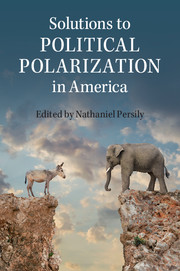Book contents
- Frontmatter
- Dedication
- Contents
- Contributors
- Introductory Chapters
- Reforming the Electoral System
- Strengthening Parties
- 8 Stronger Parties as a Solution to Polarization
- 9 Reducing Polarization by Making Parties Stronger
- 10 Focus on Political Fragmentation, Not Polarization: Re-Empower Party Leadership
- 11 Two Approaches to Lessening the Effects of Partisanship
- Empowering and Informing Moderate Voters
- Lowering Barriers to Policy Making
- Index
- References
9 - Reducing Polarization by Making Parties Stronger
from Strengthening Parties
Published online by Cambridge University Press: 05 May 2015
- Frontmatter
- Dedication
- Contents
- Contributors
- Introductory Chapters
- Reforming the Electoral System
- Strengthening Parties
- 8 Stronger Parties as a Solution to Polarization
- 9 Reducing Polarization by Making Parties Stronger
- 10 Focus on Political Fragmentation, Not Polarization: Re-Empower Party Leadership
- 11 Two Approaches to Lessening the Effects of Partisanship
- Empowering and Informing Moderate Voters
- Lowering Barriers to Policy Making
- Index
- References
Summary
As we meet amid yet another manufactured fiscal crisis, one hardly needs to exert much effort to argue that the polarization of our political leadership is the central challenge to good governance in the contemporary United States. So discussions about how to reduce polarization and mitigate its effects are both timely and worthwhile.
Of course, we are not nearly the first researchers to take up these questions. The polarization of America's officeholders has been at or near the top of the academic research agenda in American politics for more than 15 years. The issue has also drawn close attention from policy practitioners, journalists, and the philanthropic community. Polarization in Washington has now surpassed the desire to spend more time with one's children as the leading rationale for the retirement of legislators. Yet despite the mountain of research and discussion, we are still far short of an evidence-based agenda for reform (see Chapter 2 in this volume for a recent review of the evidence about the causes of polarization).
In this chapter, I suggest one reason why we do not know much more about how to reduce polarization than we did 15 years ago. It is because we still have a poor understanding of the role played by political party organizations in producing more or less polarization.
A central confusion in both the academic literature and public discussions of legislative polarization in the United States is the conflation of polarization and partisanship. This confusion arises naturally because the two phenomena are hard to distinguish empirically. For example, using roll-call votes and derived indices, political scientists have noted the increasingly divergent positions of the parties (see McCarty [2011] for a discussion of the measurement of legislative ideal points and polarization). But it is very difficult to discern whether those increased differences reflect true ideological changes or simply increased intraparty cooperation and interparty conflict.
- Type
- Chapter
- Information
- Solutions to Political Polarization in America , pp. 136 - 145Publisher: Cambridge University PressPrint publication year: 2015
References
- 11
- Cited by



